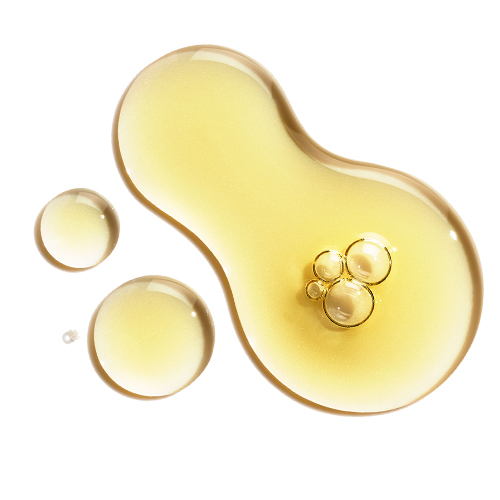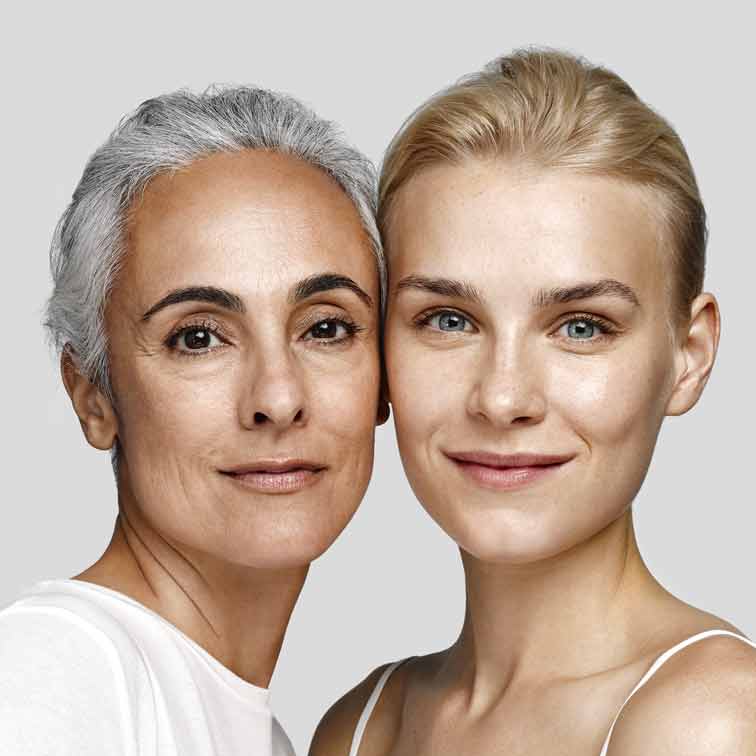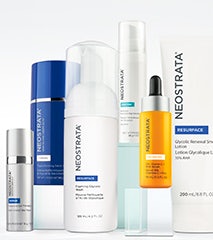All About Polyhydroxy Acid (PHA) and Its Benefits in Skincare
What is Sensitive Skin?
‘Sensitive skin’ is a common skin-type term that gets thrown around frequently, but what exactly does it mean? Sensitive skin is defined as having heightened sensory responses to chemical, environmental or even social triggers. Approximately 70% of the population consider themselves to have sensitive skin.1 If you have sensitive skin you’re more likely to experience stinging, itching, burning, dryness, redness or breakouts. Though the causes of sensitive skin are still unclear, studies show that an impaired skin moisture barrier is more susceptible to external aggressors, which can penetrate the skin and induce irritation.2 It’s important to use a skincare regimen that lets you care for your skin’s moisture barrier with gentle formulations and well-tolerated antiageing ingredients like Polyhydroxy Acids (PHAs).
What Are Polyhydroxy Acids (PHAs) and What are the Benefits for your Skin?
In addition to the breakthrough discovery of the Alpha Hydroxy Acids (AHAs), the founders of NeoStrata discovered the next generation of skincare acids, Polyhydroxy Acids (PHAs), that help to improve your skin’s tone, texture and overall radiance. Polyhydroxy Acids are considered an all-star antiageing ingredient for sensitive skin. Unlike AHAs, PHAs are gentle, non-irritating and help to strengthen the skin’s moisture barrier making them ideal for any skin type, including sensitive or reactive skin types. Some of the main benefits of Polyhydroxy Acid include:
PHAs provide gentle exfoliation.
PHAs help strengthen skin’s moisture barrier.
PHAs do not cause sun sensitivity.
PHAs have antioxidant and humectant properties.
PHAs can be used post-procedure.
PHAs are ideal for sensitive and reactive skin types.
What are the top Polyhydroxy Acids (PHAs) To Use in a Skincare Routine?
Gluconolactone: Gluconolcatone is found naturally in the skin and provides antiageing and gentle exfoliating benefits without sun sensitivity. Sensitive skin types, as well as those who have had recent superficial cosmetic procedures, will find comfort in this molecule’s gentle nature. Gluconolactone strengthens the skin’s moisture barrier leaving it more resilient, while also providing potent antioxidant benefits.
Lactobionic & Maltobionic Acid: Also known as “Bionic Acids” are derived from natural sugars. They help to reduce the appearance of lines and wrinkles, discolouration, enlarged pores and roughness through gentle exfoliation. The bionics are a key choice for very dehydrated, parched and dry skin types.
How to Incorporate PHAs into Your Skincare Routine
Thankfully, PHAs are included in a wide array of products from cleansers and toners, to moisturisers, serums and treatments. Developed specifically for sensitive complexions, the Restore Collection features gentle yet effective PHAs for full-strength antiaging benefits without irritation. Nourish your sensitive skin with these skin-loving PHA formulations.
PHA Products to Try:
Cleanser: PHA Facial Cleanser
What it Does: A soap-free, fragrance-free, non-foaming gel cleanser that is gentle and ideal for sensitive and reactive skin.
Why You Need It: PHA formulation with Gluconolactone gently exfoliates while effectively removing makeup and impurities without irritation.
Toner: PHA Renewal Pads
What it Does: These pre-soaked tonic pads for the face are infused with 4% Polyhydroxy Acid (PHA), which is suitable for sensitive skin.
Why You Need It: It’s 4% PHA formula gently exfoliates dull skin to reveal a more radiant, even appearance and can be used after cleansing to balance, reset and prime skin.
Face Serum: 15% Vitamin C + PHA Serum
What it Does: A potent brightening face serum that gently exfoliates with 4% PHA, allowing the 15% Pure Vitamin C to absorb into fresh, renewed surface layers of skin.
Why You Need It: It’s clinically proven to target the look of dark spots, fine lines, wrinkles and other signs of photoaging for skin that appears dramatically brighter, more even and youthful.
Face Cream: Bionic Face Cream
What it Does: Provides intense hydration and helps soothe and revitalise the look of stressed skin.
Why You Need It: A rich, soothing emollient designed for dry, reactive skin.
Eye: PHA Eye Cream
What it Does: Hydrating eye-area treatment that is fragrance-free and ophthalmologist tested. It visibly reduces fine lines and leaves skin soft and supple.
Why You Need It: This antiaging eye cream improves skin’s resiliency and contains Gluconolactone, nourishing oils and Hyaluronic Acid.
Sunscreen: Sheer Physical Protection SPF 50
What it Does: A tinted, broad spectrum sunscreen SPF 50 with mineral sunscreens zinc oxide and titanium dioxide.
Why You Need It: This mattifying fluid sunscreen combines potent antioxidants with PHAs Gluconolactone and Lactobionic Acid to protect and strengthen skin’s moisture barrier against environmental aggressors.
FAQ:
What is the difference between PHA and AHA?
Polyhydroxy Acids (PHAs) have the same skincare benefits as Alpha Hydroxy Acids (AHAs), which aim to improve skin’s overall tone, texture and radiance, but without any of the potentially irritating side effects.
What are the benefits of using PHA in skincare?
PHAs provide gentle exfoliation, help strengthen skin’s moisture barrier, have antioxidant and humectant properties, can be used post-procedure, do not cause any sun sensitivity and are ideal for use on sensitive and reactive skin types.
Can PHA be used on sensitive skin?
Yes, PHAs are an ideal choice for sensitive and reactive skin types.
How often should I use PHAs in my skincare routine?
PHAs can be used in your skincare routine twice daily.
Can PHAs be used with other exfoliants like AHAs and BHAs?
If your skin is tolerant to all of the ingredients, you can use a combination of PHAs, AHAs and BHAs. However, if your skin is particularly sensitive, you should stick to just PHAs alone for gentle exfoliation and antiageing benefits.
Are PHAs suitable for all skin types?
In general, PHAs are well tolerated by all skin types, particularly those with sensitive or reactive skin.
Are PHAs pregnancy safe?
Yes, PHAs are gentle enough to use during pregnancy. We do recommend that all pregnant and lactating women, or those currently planning to become pregnant, seek the advice of their physician before using any new skincare products.
References
- Berardesca, E., Farage, M., and Maibach, H. (2013). Sensitive skin: An overview. Int J Cosmet Sci, 35(1), 2-8.
- Kabashima, K., and Egawa, G. (2016). Multifactorial skin barrier deficiency and atopic dermatitis: Essential topics to prevent the atopic march. J Allergy Clin Immunol, 138(2), 350-358.







